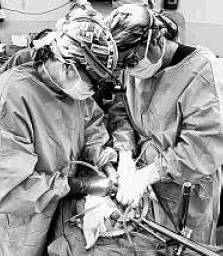Pig kidneys implanted in a brain-dead patient
By Roni Caryn Rabin NEW YORK TIMES
Surgeons at the University of Alabama at Birmingham reported Thursday that they had for the first time successfully transplanted kidneys from a genetically modified pig into the abdomen of a 57-year-old brain-dead man.
The announcement was the latest in a series of remarkable feats in organ transplantation. Earlier this month, surgeons at the University of Maryland transplanted a heart from a genetically modified pig into a 57-year-old patient with heart failure. That patient is still alive and under observation.
In September, surgeons at NYU Langone Health attached a kidney from a genetically modified pig to a brain-dead individual who was being maintained on a ventilator. Although it remained outside the body, the kidney worked normally, making urine and creatinine, a waste product.
The UAB surgery was reported in the American Journal of Transplantation, the first time a pig-to-human organ transplantation has been described in a peer-reviewed medical journal.
According to the surgical team, the pig kidneys started functioning and making urine after about 23 minutes and continued to do so for three days, though one kidney made more urine than the other.
The patients’s own kidneys were removed, and there were no signs indicating rejection of the pig organs.
Dr. Jayme Locke, the lead surgeon, said the procedure had closely followed all of the steps of a regular human-to-human transplant operation and that critical safety questions had been addressed, laying the groundwork for a small clinical trial with live patients that she hoped to begin by the end of the year.
Many of the previous operations have been unique experiments, not part of ongoing trials.
“Our goal is not to have a one-off, but to advance the field to help our patients,” said Locke, who is director of UAB’s Incompatible Kidney Transplant Program. “What a wonderful day it will be when I can walk into clinic and know I have a kidney for everyone waiting to see me.”
In the paper, she and the other authors thanked the family of the brain-dead individual, James Parsons, for consenting to the research and said they would name this type of study after Parsons, a registered organ donor from Huntsville, Ala., who sustained his injury during a motorcycle race in September.
More than 500,000 Americans have end-stage kidney disease and depend on dialysis. A transplant is the best treatment for kidney failure, but an acute shortage of donor organs leaves that option out of reach for the vast majority of patients.
More than 90,000 people were on waiting lists for a kidney as of last summer. The wait can be long: Fewer than 25,000 kidney transplants are done in the United States each year, and more than a dozen people on the waiting list die each day.
Researchers have long sought to grow organs in pigs that are suitable for transplantation into humans, and in recent years new technologies like cloning and genetic engineering have brought that vision closer to reality.
